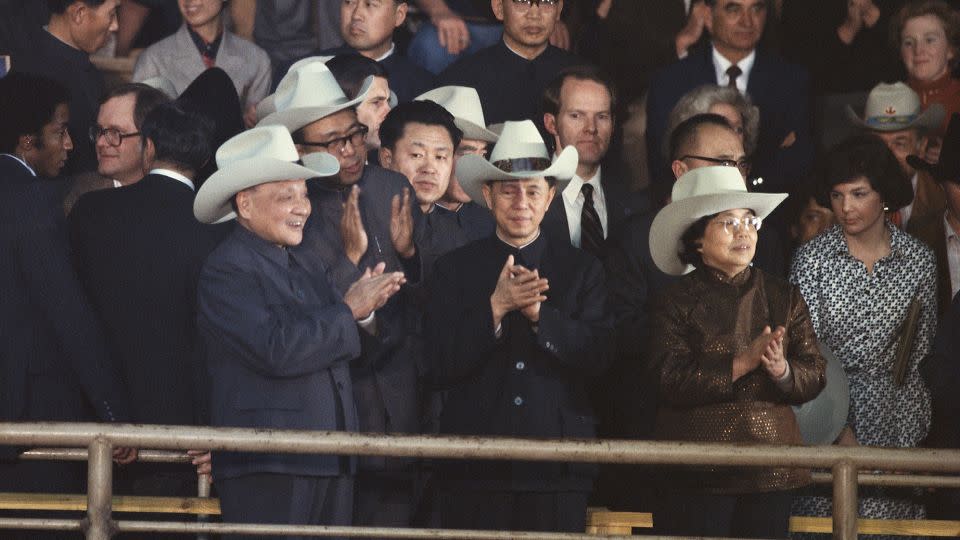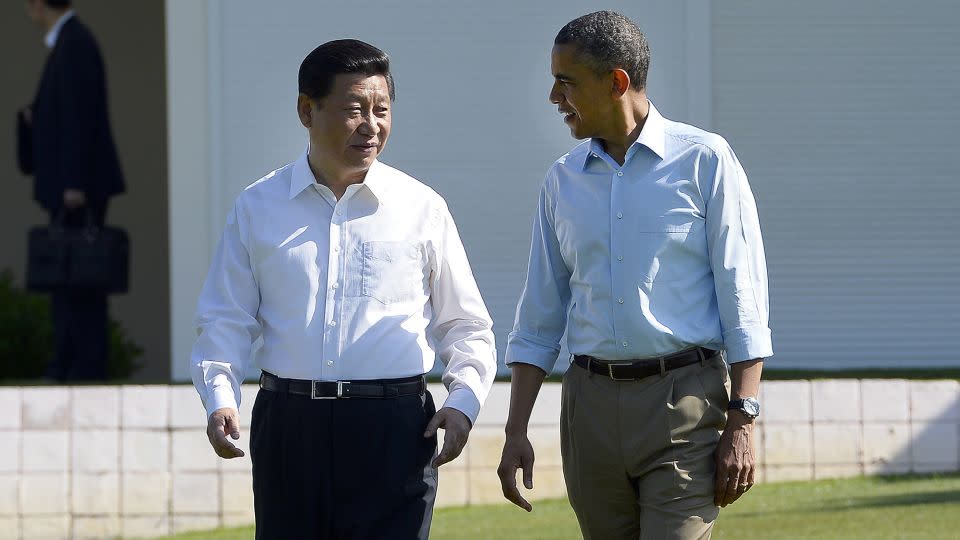Six years on from cake at Mar-a-Lago, China’s Xi returns to a much warier US
Editor’s Note: Sign up for CNN’s Meanwhile in China newsletter which explores what you need to know about the country’s rise and how it impacts the world.
When Xi Jinping last set foot in the United States, former-President Donald Trump welcomed the Chinese leader to his palm-tree-lined home at Mar-a-Lago. In the glow of warm candlelight, the two leaders bonded over the “most beautiful piece of chocolate cake” and a popular Chinese folk song serenaded by Trump’s grandchildren.
Touting the “great chemistry” between them, Trump lavished praises on Xi after their first personal meeting and predicted that “lots of very potentially bad problems will be going away.”
More than six years after that honeymoon summit in the Florida resort, the US is preparing to host the Chinese leader again – this time in a much less intimate setting and with the world’s two largest economies looking more like a distrustful couple on the verge of divorce.
Xi, who is set to attend the Asia-Pacific Economic Cooperation (APEC) summit in San Franscisco and meet with US President Joe Biden on the sidelines, will find himself arriving in an America that has significantly hardened its view against him. Being tough on China has become a rare point of convergence in the increasingly polarized politics of his host country.
And these hard feelings are mutual. In Beijing, those officials who have long suspected America’s intentions and resented its influence now feel vindicated in their belief that the US is out to contain and suppress China.
Much has happened in between Xi’s two visits: a bruising trade war, a global pandemic and a raging war in Europe – each dealing deep blows to the US-China relationship as it deteriorated to its worst in decades.
What started as a Trump-era fight over trade quickly spilled over into other areas, from technology, national security and geopolitics to visions for the global order – competitions that have only intensified under the Biden administration.
Relations plunged to a new low last August, when Beijing cut off major communication channels with Washington in retaliation for a high-level US visit to Taiwan. Attempts to restore dialogue were derailed this February by an alleged Chinese surveillance balloon shot down over US airspace.
The US has since spent months seeking to engage its biggest strategic rival, including dispatching four cabinet-level officials to Beijing over a busy summer in the Chinese capital.
Beijing has played it cool. When Chinese Foreign Minister Wang Yi finally reciprocated with a visit to Washington DC last month – seen as a hopeful sign for the Xi-Biden summit, he warned Americans that “the ‘road to San Francisco’ will not be a smooth one.”
In addition to the bumpy journey to get there, the setting of the meeting is also telling.
Xi is arriving in the US this week along with nearly two dozen world leaders for the APEC summit, an event that is much more formal and business-like than the get-to-know-you meeting at Trump’s private residence in 2017.
Back then, the Mar-a-Lago summit was aimed at building a personal relationship, said Yun Sun, director of the China program at the Stimson Center think tank in Washington.
“The (US-China) relationship was not tanked, yet,” Sun said. “When he visited, the Chinese were still hoping (for) leadership diplomacy and that they could potentially have a very good relationship.”
Xi and Biden had already known each other for more than a decade and spent dozens of hours together across the US and China before Biden became President. The two met for the first time as state leaders last year in Bali, Indonesia, on the sidelines of the G20 summit.

Diplomacy with personal touch
Diplomacy with a personal touch has been a central feature in visits by Chinese leaders to the US.
When diplomatic relations were restored in 1979, US President Jimmy Carter invited China’s paramount leader Deng Xiaoping on a groundbreaking trip to America – and the two leaders established a personal rapport.
In his personal diary, Carter described Deng as “smart, tough, intelligent, frank, courageous, personable, self-assured, friendly,” calling his visit “one of the delightful experiences of my Presidency.”
During that trip, the Chinese Communist leader famously donned a 10-gallon cowboy hat at a Texas rodeo in front of a cheering crowd – a moment that captured the imagination of the American public.
Deng’s successor Jiang Zemin, known for his larger-than-life personality and many musical talents, often surprised his American hosts by bursting into impromptu songs and dances.
On his maiden visit to the US in 1997 – the first by a Chinese leader after the Tiananmen Square massacre, Jiang softened the edges of his image by singing Peking opera at a gala banquet in California and playing the ukulele at a dinner in Hawaii.
Five years later, President George W. Bush invited Jiang to his ranch in Texas before the two attended the APEC summit in Mexico.
That personal approach was at work again when Xi met President Barack Obama for the first time in 2013, months after he took the helm of China.
At Sunnylands, a lush Californian desert retreat, the two leaders chatted and smiled as they strolled along a manicured lawn and over a small bridge. In fitting with the informal setting, they left their ties and suit jackets behind. At the end of that summit, Obama declared the visit “terrific.”
That friendly stroll at Sunnylands also inspired the famous meme comparing Xi to Winnie the Pooh, after pictures juxtaposing Xi and Obama with the honey-loving bear and his tiger friend Tigger went viral on Chinese social media. As a result, Winnie the Pooh has become an unlikely target of censorship in China.
Sun, the expert at the Stimson Center, said this type of personal diplomacy between top leaders was regarded as very important in shaping and consolidating bilateral ties.
“But I think we have passed that stage now. I can hardly imagine that Biden invites Xi Jinping to his private residence,” she said.
“San Francisco will be very business. And it will be very official.”

Disillusionment grows
A few years into Xi’s presidency, American officials began to realize that they could not always count on the Chinese leader’s promises made during personal diplomacy.
A major sore point was a 2015 promise by Xi during a US state visit that he would not “pursue militarization” of the South China Sea, a vow that stood in stark contrast to what then happened.
“Those four years of the Obama administration really had tremendous damage on American confidence about what China’s behavior looks like under Xi,” Sun said.
It was notable that Xi’s visit to Mar-a-Lago came within three months of Trump’s inauguration.
“(Xi) wanted to establish a good relationship with Trump at an early stage to keep that momentum,” said Suisheng Zhao, director of the Center for China-US Cooperation at the University of Denver.
“But Trump is a totally different animal.”
Within months Trump was accusing China of doing “NOTHING” to thwart North Korea’s quest for nuclear weapons and soon after that the trade war began.
“Now, we’re at a place where both sides have had a lot of damage on their trust in each other, and both sides are discovering that our national interests fundamentally do not align,” Sun said.

Iowa farms, Golden Gate portrait
This week’s visit will be Xi’s fifth trip to America as China’s top leader, and the tenth US trip in his life.
Xi first came to the US at age 31 in 1985, in what is believed to be his first trip outside China. Back then, the fresh-faced, little-known official was serving as the party boss of an impoverished county in central Henan province.
He led a five-men agricultural delegation to learn about crop and livestock practices in Iowa, where he visited farms, picnicked on a cruise on the Mississippi River and stayed with an American family.
As part of the trip, Xi also made a stop in San Fransisco and posed for a photo in front of the iconic Golden Gate Bridge.
In the ensuing decades, Xi visited the US four more times before he took power in late 2012.
Before bilateral relations took a sharp turn for the worse, Chinese official propaganda often paraded those visits as an example of the deep, long-standing friendship between the US and China.
Experts say it’s hard to know whether or how Xi’s early visits to the US might have impacted his views of America.
Zhao, the scholar at University of Denver, said Xi’s personal experience is likely to have a very superficial impact. “That might have affected his thinking if he was (an ordinary person and) not the strongman leader he is today,” he said.
Sun said while Xi has tried to strike the image as a great power statesman, he is “primarily a domestic politician.”
“I don’t know if Xi Jinping’s earlier visits of the United States had a major impact on his foreign policy. I think his foreign policy style is decided by his domestic political style, which is: I’m the Emperor and I decided it all.”
CNN’s Simone McCarthy contributed reporting.
For more CNN news and newsletters create an account at CNN.com


